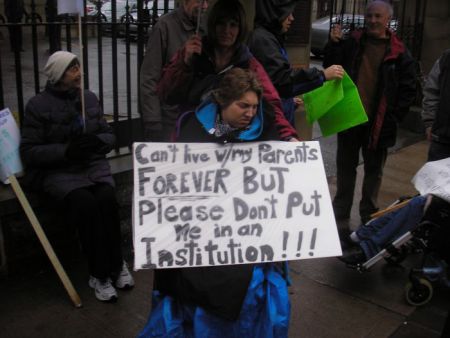KJIPUKTUK, (HALIFAX) - In Nova Scotia people who live with developmental disabilities are kept locked up for years on end.
Not because they committed a crime, not for compelling medical reasons, but simply because it is cheaper and there are no other options at this time.
Three such individuals and two organizations now have filed a complaint with the Nova Scotia Human Rights Commission.
They believe that that the Province has failed to provide supportive housing in the community, and as such has discriminated against them because of the combined effect of mental disabilities and being on social assistance.
The Human Rights Commission has referred the complaint to a Board of Inquiry. Hearings will likely occur in the fall.
One of the two organizations, the Disability Rights Coalition, has been granted legal standing, but the Elizabeth Fry Societies will not be allowed to participate.
Beth MacLean is one of the three individual complainants.
For almost fifteen years now MacLean has lived in Emerald Hall, a locked psychiatric ward in the Nova Scotia Hospital, very much against her will.
It's noisy and the threat of violence is always present, she writes in the formal complaint. She gets out only when a staff member happens to be free, maybe twice a week, if she's lucky.
MacLean is in her mid-forties and is labeled as living with a mood disorder and mild mental retardation. She has been institutionalized since she was ten years old.
“I don’t want to live at Emerald Hall. I want to live in a home, on a street in a neighborhood and to live a normal life,” she writes.
“I have been unable to properly develop or to receive an education. I have been deprived of the chance to work and do other things in the community.”
There is no medical or legal need for MacLean to be at Emerald Hall.
What's stopping her from living in the community, MacLean believes, is a lack of support from Community Services, and the Province altogether.
What MacLean, and the people who share her fate, want is a small (2-3 person) living situation in a home in the community, with support staff as required.
The decision by the Human Rights Commission to hold hearings is significant.
“We're highly pleased that the Commission feels that there is enough merit to the complaint to warrant a full hearing,” Vince Calderhead, lawyer for the three individuals, tells the Halifax Media Co-op.
“The significance is that the Human Rights Board will hear evidence and will need to decide whether the failure (by the Province) to provide community-based housing is discriminatory against people with disabilities,” Calderhead explains.
People living with disabilities, their caretakers, and support organizations have been complaining for decades that something needs to be done.
Some people are needlessly institutionalized, others are looked after by aging parents, who struggle to keep up and worry what the future will bring.
In 2013 it appeared that the then NDP government was listening. Rallies at Province House, letters to the minister, reports, and a series of angry town halls finally seemed to bring results.
Large institutions were to be phased out and Community Services was to engage in a more individualized approach in terms of care and funding.
Current Minister of Community Services Joanne Bernard has said that she is fully committed to what is commonly referred to as the roadmap, a document co-authored by stakeholders and civil servants that describes how that transition will unfold.
Yet waiting lists for residential housing have grown, organizations that co-authored the roadmap have seen their funding reduced, and have felt out of the loop altogether. Rumours that various pilot projects are not working out abound.
Calderhead points out that the human rights case was initiated well before the transition roadmap was announced.
“But the facts that there is a human rights complaint, and that there is a roadmap, are a recognition that the current system is completely broken”, says Calderhead.
“There needs to be real reform. If our complaint is found to be valid and the current system to be discriminatory, than that Board of of Inquiry decision, could well serve to inform the transformation process,” Calderhead says.
Community Services declined to comment on the Human Rights complaint since it is now before a Board of Inquiry.
Earlier the Halifax Media Co-op asked Community Services a series of questions around transition benchmarks and stakeholder inclusion, only to receive evasive non-answers.
See also: Community Services Transition Roadmap hits speedbump
Follow Robert Devet on Twitter @DevetRobert



